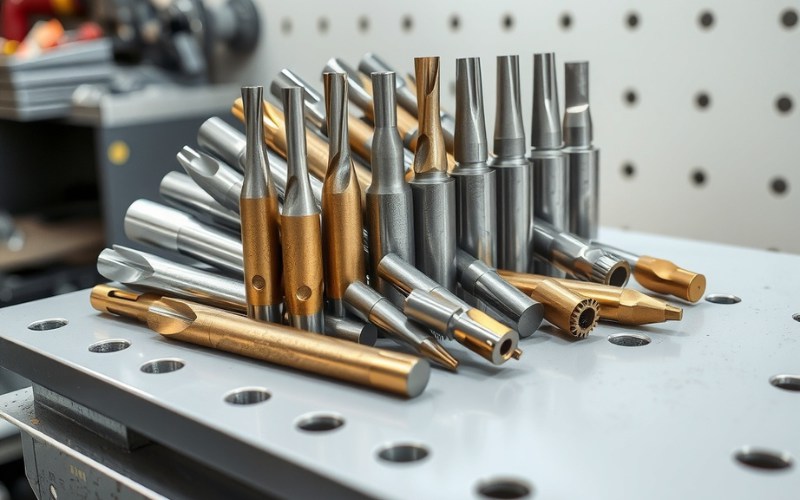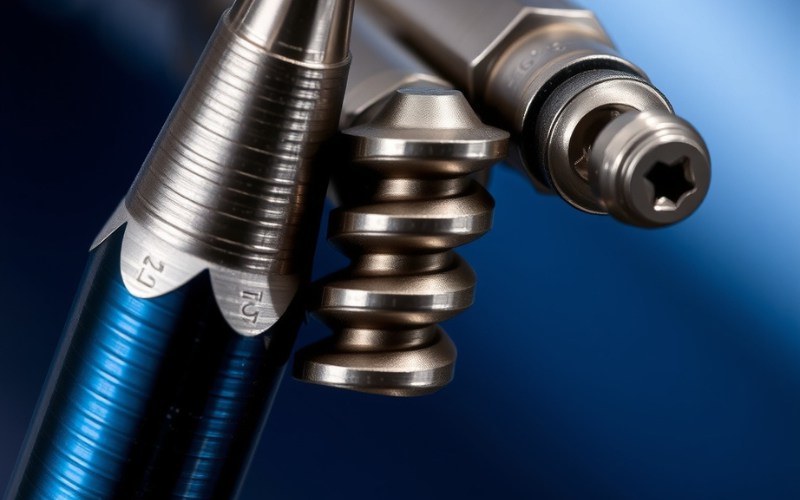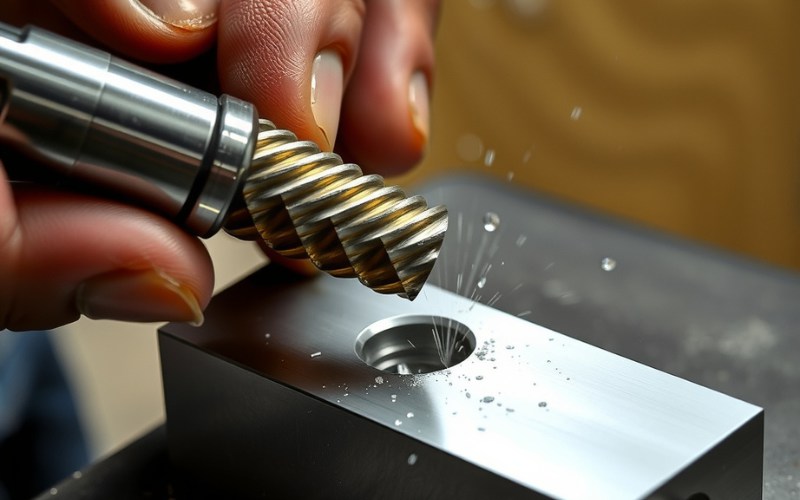Let Istar help you get started on your project with our experience and know-how!
Upload your design files and production requirements and we will get back to you within 30 minutes!

Using the right tool for the job is very important. This is very true when you are making threads. Using the wrong kind of thread tap can lead to bad threads, broken taps, and a lot of trouble. That is why I wrote this guide. It will help you learn about the different kinds of thread taps. It will also help you pick the right one for your work. It does not matter if you are a pro or just like to build things at home. This article will give you the information you need to make great threads every time.
When you cut a thread by hand, you will probably use a set of hand taps. These are the most common kinds of taps. They are often sold in a tap set of three. The set has a taper tap, a plug tap, and a bottoming tap. Each one has a different kind of taper. The taper is the pointed end that helps the tap start cutting the thread.
The taper tap has the most taper. It has about 8 to 10 threads that are tapered. This long taper makes it easy to start the tap in a new hole. It also makes sure the thread goes in straight. The taper tap cuts slowly and gently. This makes it the best choice to start threads in hard materials. You can use a taper tap to start a thread in a blind hole. But it will not cut the threads all the way to the bottom.
Next in the set is the plug tap. This tap has a shorter taper than the taper tap. It usually has 3 to 5 threads that are tapered. The plug tap is often used after the taper tap to cut the threads deeper. It is a good tap for many jobs. You can use it for holes that go all the way through. You can also use it for blind holes if there is enough space at the bottom.
Last, there is the bottoming tap. This tap has a very short taper. It has only 1 to 2 threads that are tapered. The bottoming tap is used to cut threads to the very bottom of a blind hole. You should always start the thread with a taper tap or a plug tap first. Then you can use a bottoming tap. Its short taper makes it hard to start in a hole with no threads. The bottoming tap has the smallest taper of the three hand taps.
| Tap Kind | Tapered Threads | Main Use |
|---|---|---|
| Taper Tap | 8-10 | Starting threads in new holes. |
| Plug Tap | 3-5 | For most jobs, making threads deeper. |
| Bottoming Tap | 1-2 | Cutting threads to the bottom of a blind hole. |

Hand taps are great for making threads by hand. But machine taps are made for use in a machine, like a drill press or a lathe. The main way they are different is speed. Machine taps are made to cut threads very fast. They can make the whole thread in one go.
Hand taps are made to be used with a tap wrench. You have to turn the tap forward and then backward a little. This helps break up the small metal pieces, called chips. If you try to use a hand tap in a machine, you will probably break the tap. This is because the straight flutes on a hand tap are not made to get rid of chips at high speeds.
Machine taps come in many styles. These include spiral point taps and spiral flute taps. They are made to handle chips at high speeds. We will talk more about those next. You can sometimes use a hand tap in a machine. But it is usually best to use a tap that is made for that machine. The names “hand tap” and “machine tap” can be tricky. Many taps sold today can be used both ways.
The flutes are the grooves on the side of a tap. They let chips move away from the cutting part. The kind of flute a tap has tells you how it handles chips. It also tells you what kind of hole it is best for.
The kind of flute you pick is a big deal for your threading job. Picking the right flute kind for your material and hole will help you make good threads and stop you from breaking your tap.
Yes, there are many different kinds of taps made for certain materials. The material a tap is made from changes its hardness and how long it lasts. Picking a tap made from the right material is very important to get good results.
Here are some of the most common materials for taps:
Some taps also have special coatings that can make them work better. Coatings like titanium nitride (TiN) can make a tap harder and more slippery. This helps it last longer and cut cleaner threads. The right tap material and coating will depend on the material you are tapping and what you are doing.
Have you ever looked at a tap and wondered what the letters and numbers meant? Those marks tell you all the things you need to know about the tap.
Here is what the standard tap markings mean:
Knowing what these marks mean is very important for picking the right tap for your job. If you are not sure what a mark means, you can always check a tap and drill chart.
Tapping a blind hole can be hard. This is because you cannot run the tap all the way through. This means that chips can get stuck in the bottom of the hole. This can cause the tap to break. That is why it is so important to pick the right kind of tap when you work with a blind hole.
The best kind of tap for a blind hole is a spiral flute tap. The spiral flutes on this kind of tap work like a screw. They pull the chips up and out of the hole as you cut the thread. This stops chips from getting stuck in the bottom of the hole. It gives you a much better chance to do the job right.
If you do not have a spiral flute tap, you can still tap a blind hole with a set of hand taps. You will want to start with a taper tap to get the thread started. Then, use a plug tap to cut the threads deeper. At the end, you will use a bottoming tap to cut the threads as close to the bottom of thehole as you can. When you do it this way, it is very important to back the tap out a lot to clear the chips.
It does not matter which kind of tap you use. It is always a good idea to use a good cutting oil or lubricant when tapping a blind hole. This will help make less rubbing and heat. It will also make it easier to cut the threads.
A pipe tap is a special kind of tap. It is used to cut threads for pipes and pipe fittings. The main way a pipe tap is different from a regular tap is that pipe threads are tapered. This taper lets the threads make a tight seal. This stops leaks when the pipe is screwed into the fitting.
There are two main kinds of pipe threads: NPT (National Pipe Taper) and NPS (National Pipe Straight). NPT threads are tapered and are used to make a seal that holds in pressure. NPS threads are straight and are used for joints that just hold things together.
You should use a pipe tap any time you need to make threads for a pipe or fitting. This includes work like plumbing, hydraulics, and gas lines. If you use a regular tap to make pipe threads, your connection will leak. Pipe taps need a different size starting hole than regular taps. So, be sure to check a tap drill chart before you start. A pipe tap has to remove a lot of metal. It is a good idea to use a tapered reamer to get the hole ready before you tap it.

Up to now, we have talked about cutting taps. These taps remove metal to make a thread. But there is another kind of tap called a forming tap. It works in a very different way. A forming tap does not cut the material. Instead, it pushes the material into the shape of the thread. This is also called cold forming or thread rolling.
Forming taps do not make chips. Because of this, they are a great choice for tapping blind holes. They also make a stronger thread than a cutting tap. This is because the grain of the material is not cut. Forming taps are also known as fluteless taps because they do not have flutes to clear chips.
But, you can only use forming taps on soft materials like aluminum and low-carbon steel. They also need a bigger hole to start with than a cutting tap does. If you are working with a material that is good for thread forming, a forming tap can be a great choice. They are often used in places that make a lot of parts. This is because they are faster and last longer than cutting taps.
Yes, you can get a custom thread tap made for a special job. There are many companies that make custom taps exactly how you need them. This can be a good choice if you are working on something that needs a strange thread size or a special kind of tap.
You might need a custom thread tap if you are:
When you order a custom thread tap, you will need to tell the company the exact details of the thread you need to cut. This will include the thread diameter, pitch, and any other special needs. A custom tap will cost more than a standard tap. But sometimes it is the only way to get the job done right. An extension tap is a kind of custom tap with a long body to reach holes that are hard to get to.
Picking the right thread tap is very important for making good threads. With so many different kinds of taps, it can be hard to know which one to pick. Here is a short list to help you make the right choice:
By thinking about these things, you can feel good that you are picking the right tap for the job. Taking the time to pick the right tap will save you time and trouble later on. There are many different kinds of thread taps. So, take the time to learn about your choices before you start your next job.